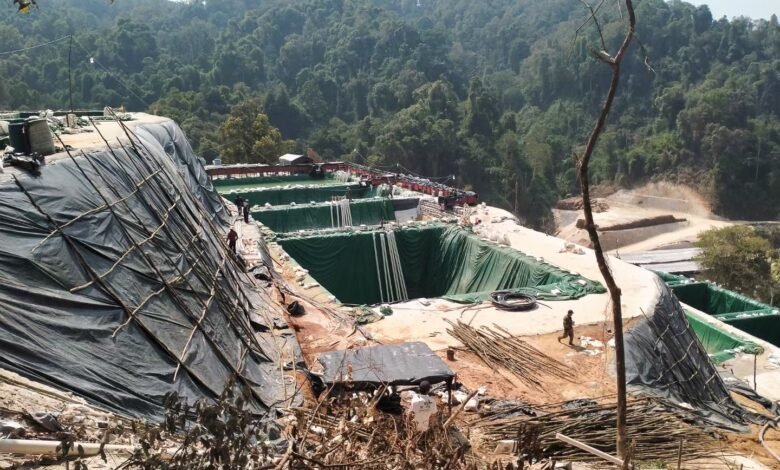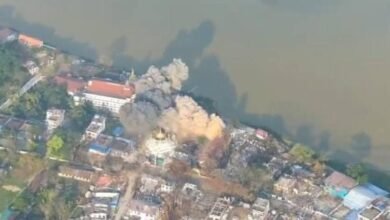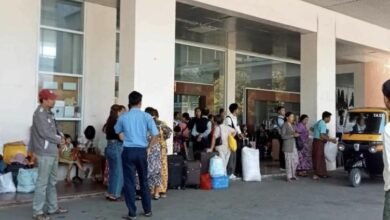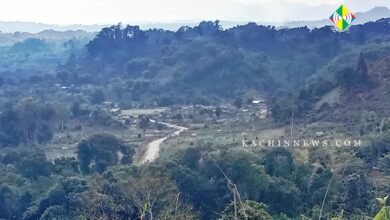KIO Halts Rare Earth Mining Expansion Following Villager Protests

General N’ban La, the Kachin Independence Organization (KIO) Chairman has informed villagers living in a stretch of the group’s territory near the Chinese border that the controversial rare earth mining projects that were slated to go ahead in their areas have been suspended on his order.
The announcement of the suspension came after many villagers living in N’ba Pa and Ding Sing Pa, near Mai Ja Yang the second largest KIO controlled town, had staged an unprecedented series of protests over the past five months in opposition to the KIO administration issuing of flurry of new permits to allow rare earth mining operations to begin.
The announcement by N’ban La, the most senior official in the KIO hierarchy and a long time commander from the group’s armed wing, marks a considerable victory of sorts for Kachin civil society who have struggled for years to convince the KIO not to expand rare earth mining operations in the thin strip of territory the KIO controls along the Chinese border where currently many refugees and political diisdents have taken shelter.
General N’ban La made the announcement about the suspension of the rare earth mining operations while speaking on April 15 to a group of more than 1,600 villagers and farmers from N’ba Pa and surrounding areas who had come to Mai Ja Yang to raise their concerns, according to a local community committee member who spoke to the Kachin News Group (KNG).
“This is now finished, the chairman of the KIO, General Nban La, has completely stopped all the rare earth projects that are being prepared in the N’ba Pa area. More than a thousand people went to a meeting with him using their own cars and motorbikes” the committee member said. “After the general said that it was completely suspended we also expressed our gratitude,” the committee member added.
On April 3, five pastors from the Kachin Baptist Convention (KBC), the largest and most influential grouping of Christians in the Kachin community, travelled to the KIO’s Laiza headquarters and met with General N’ban La and other senior KIO officials to explain the villager’s concerns. A grouping of Catholic officials had also in similar fashion urged the KIO not to go ahead with the expansion of the rare earth mining.
At the meeting with the KBC pastors, it was agreed that the KIO chief would go and meet the affected communities in Mai Ja Yang on April 15. General N’ban La had temporarily left his position earlier in the year due to health reasons but the veteran Kachin commander, who is known for his blunt and direct speaking style, recently resumed serving as the KIO chairman.
“All the people are very happy. I would like to express my special thanks to the leader for listening to the concerns of the local people who are worried about the destruction of the forest in our area. Be a great leader who can lead the country better.” said a member of the committee formed to oppose the rare earth mining.
The KIO administration had granted permission to companies from neighbouring China to carry out mining exploration for rare earth mining in N’bapa and Ding Sing Pa which are in a part of Mansi Township, that has long been controlled by the KIO.
Many of the villagers opposed the decision to allow the Chinese firms to conduct rare earth operations in their area, with some villagers actively resisting the activities of the Chinese mining firms last month.
The villagers said they were concerned about the environmental and health impacts of the rare earth mining and the toxic heavy metal laden run off from the mines that would poison their farms and nearby forests and streams. The villagers are not alone in being concerned about rare earth mining, there is a general consensus among scientific experts that rare earth mining is one of the most toxic and environmentally harmful types of mining in the world due to the array of hazardous chemicals involved in the mining process, the highly toxic tailings generated and the lingering radioactive footprint rare earth mining leaves behind.
Just prior to N’ban La’s announcement that he was going to suspend the rare earth operation, on April 13, a grouping of more than 20 Kachin civil society organizations jointly issued a statement urging the KIO to completely stop all rare earth mining activities in N’ba Pa and Ding Sing Pa areas. The CSOs expressed concern that the KIO lacked the technical expertise to properly monitor and regulate the mining of rare earth in KIO territory. Kachin activists and CSOs have also repeatedly warned that allowing the further expansion of rare earth mining would have devastating consequences for the people living in KIO territory and their subsequent future generations.
Although the full details and ramifications of N’ban La’s announcement have to yet be disclosed it appears that the ban will cause rare earth mining to be halted in Hka U, Hpang Dang, Da Rawng, Hka Pra, Chying Lap Pa, in addition to Ding Sing Pa, and Nba Pa villages. These are all villages that are in the KIO controlled parts of Mansi Township.
Rare earth mining first began in the KIO territory near Mai Ja Yang in the early 2000s during the now defunct 17 year ceasefire between the KIO and the central government. Rare earth mining operations in the KIO area have fluctuated considerably over the past two decades with many of the Chinese run operations being clearly tied to the global price for rare earth. Rare earth mining has expanded when the price is high and then conversely many rare mining operations in the KIO area have been left dormant and abandoned when the price of rare earth goes down.
A number of rare earth mines are also known to be full operation in the isolated stretch of mountainous territory known as Kachin State Special Region No 1, a jurisdiction that encompasses Pangwa, Kambaiti, Chipwe, and Tsawlaw. This area which is the long time fiefdom of the notorious pro military militia leader Zahkung Ting Ying founder of New Democratic Army – Kachin (NDA-K), is thought to have the highest concentration of rare earth mining in all of Myanmar.




